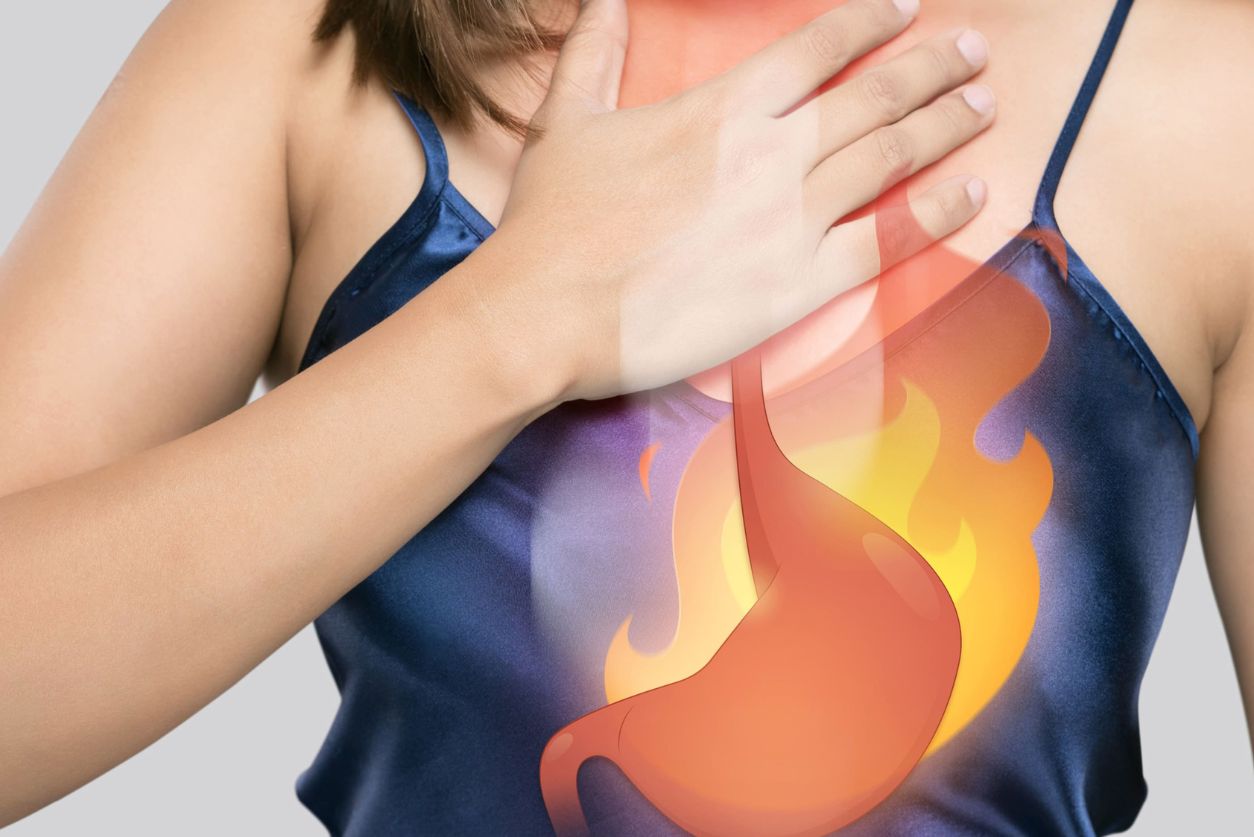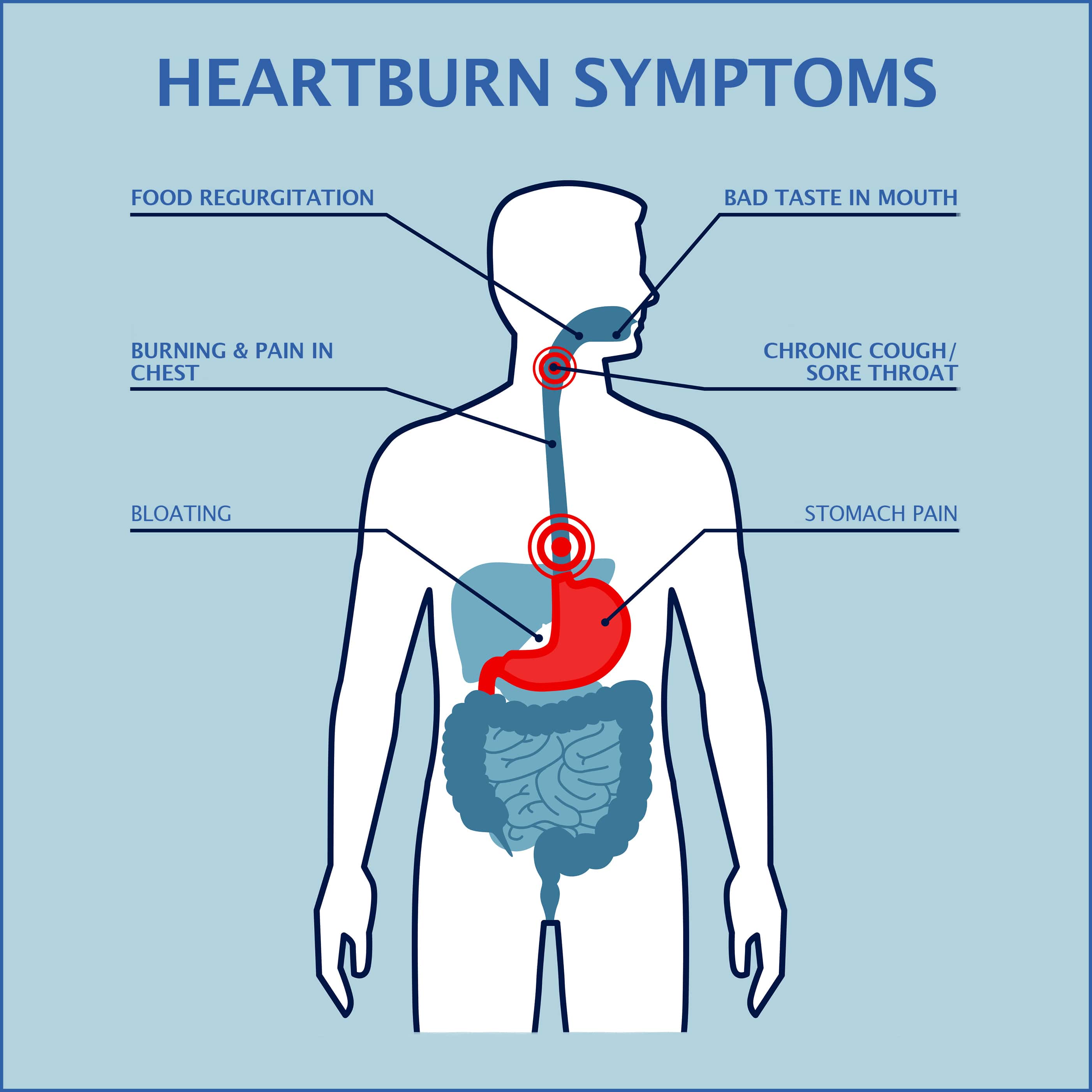
My chest is burning! What do I do? Am I having a heart attack? Is this GERD or heartburn?
By: Kruti Patel and Vishal Gupta, M.D.
It came out of nowhere. One second, you’re lying down enjoying your favorite TV show, and the next, you have a burning pain in the middle of your chest. You’re likely experiencing heartburn. Don’t worry; you’re not alone. The American College of Gastroenterology estimates that over 15 million Americans experience heartburn every single day.
What is heartburn?
Heartburn often feels like its namesake—a burning sensation in the middle of your chest. Heartburn is a typical indicator of acid reflux. Acid reflux is a condition where acid from the stomach travels back up into the esophagus. People of all ages can develop heartburn, and symptoms can vary. Some people experience a burning sensation in their chest or throats, some experience indigestion-like pain, and others can have an acidic taste in their mouths.
Common causes of heartburn vary and can include smoking, obesity, and diet. Heartburn or acid reflux is also common in women who are pregnant. This occurs either due to the baby pressing up against the stomach or hormonal changes.
Large meals and fatty foods are common triggers of heartburn. Greasy meals right before bedtime can often cause flares of heartburn. Similarly, acidic foods and drinks can also cause breakthrough symptoms.
Food and drinks that can trigger heartburn include:
- Alcohol, especially red wine.
- Chocolate.
- Citrus, including lemons, limes, and oranges.
- Coffee.
- Caffeinated drinks, including soda and tea.
- Garlic.
- Peppermint.
- Spicy foods.
- Tomatoes and tomato sauce.

What should I do now?
When experiencing significant or persistent heartburn or acid reflux, it is important to inform your primary care provider and visit a gastroenterologist as soon as possible. Depending on the cause of your symptoms, your gastroenterologist will recommend the best treatment for you.
What is a gastroenterologist?
Gastroenterologists are physicians specializing in managing and treating diseases involving the gastrointestinal tract, liver, pancreas, gallbladder, and bile ducts. The GI (gastrointestinal) tract is expansive and includes the esophagus, stomach, small intestine, large intestine (also known as the colon), and rectum.
Gastroenterologists often perform endoscopy procedures to diagnoses and treat GI disorders. These include colonoscopy, esophagogastroduodenoscopy (EGD), endoscopic ultrasound, endoscopic mucosal resection (EMR), and flexible sigmoidoscopy procedures. Endoscopic procedures typically involve inserting a small, flexible scope with a camera on the end into the mouth or anus.
What are treatment options for heartburn?
Depending on the cause of your heartburn, your gastroenterologist will recommend treatment. Common treatments for heartburn include over-the-counter or prescription medications. These can include:
- Over-the-counter antacids: Low-dose medications that can help relieve mild heartburn. Examples of antacids include Alka-Seltzer, Tums, Milk of Magnesia, Gaviscon, Maalox, Mylanta, Rolaids, and Pepto-Bismol.
- Proton pump inhibitors (PPIs): Medications that reduce the amount of acid present in the stomach. Some common ones are Prilosec, Prevacid, and Nexium.
- H2 blockers: These medications also reduce the level of acid in the stomach and can help heal the esophageal lining if it has been damaged. Pepcid, Tagamet and Zantac are popular examples.
Depending on the severity of your symptoms, your gastroenterologist may also recommend dietary or lifestyle modifications to help improve your symptoms. These can include:
- Avoiding trigger foods that cause heartburn, such as fatty or spicy foods.
- Avoiding overeating.
- Avoid eating before bedtime. Allow 2-3 hours for your food to digest and not lie down immediately after eating.
- Exercising regularly.
- Smoking cessation.
- Raising the head of your bed. This allows gravity to help relieve your symptoms.
- Weight loss.
Contacting Us
If you are dealing with heartburn, we urge you to contact the experienced, trained, and caring team of physicians at Gastroenterology of Greater Orlando. Our practice began more than 15 years ago and has emerged as one of the leading gastroenterology practices in Central Florida. We perform a host of diagnostic procedures using state-of-the-art equipment in a friendly, comfortable, and inviting atmosphere where patient care is always a top priority. Contact us today at (386) 668-2221!